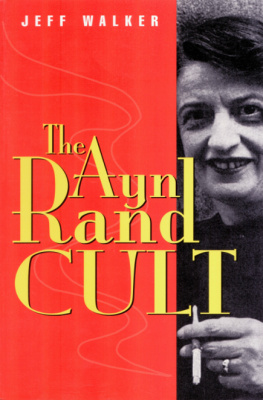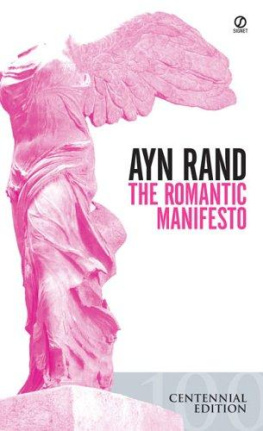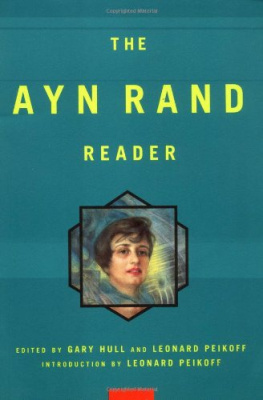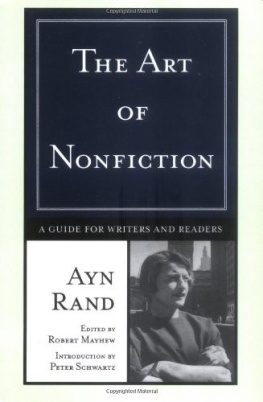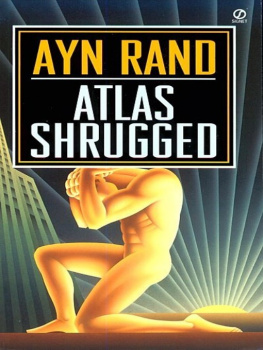AYN RAND


THE PENNSYLVANIA STATE UNIVERSITY PRESS
UNIVERSITY PARK, PENNSYLVANIA
Library of Congress Cataloging-in-Publication Data
Sciabarra, Chris Matthew, 1960
Ayn Rand : the Russian radical / Chris Matthew
Sciabarra.Second edition.
p. cm
Summary: Analyzes the intellectual roots and philosophy of Ayn Rand. Second edition adds a new preface and an analysis of transcripts documenting Rands education at Petrograd State UniversityProvided by publisher.
Includes bibliographical references and index.
ISBN 978-0-271-06227-3 (pbk. : alk. paper)
1. Rand, Ayn.
2. Objectivism (Philosophy).
3. Dialectic.
4. PhilosophersRussia.
5. PhilosophersUnited States.
I. Title.
B945.R234S35 2013
191dc23
2013027117
Second edition copyright 2013 Chris Matthew Sciabarra
Original copyright 1995 Chris Matthew Sciabarra
All rights reserved
Printed in the United States of America
Published by The Pennsylvania State University Press,
University Park, PA 16802-1003
It is the policy of The Pennsylvania State University Press to use acid-free paper for the first printing of all clothbound books. Publications on uncoated stock satisfy the minimum requirements of American National Standard for Information SciencesPermanence of Paper for Printed Library Materials,
ANSI Z39.481992.
To the memory of my Uncle Sam,
for his guidance, loyalty, support, and love
CONTENTS
Appendix III: A Challenge to Russian Radical
and Ayn Rand (2013)
Nearly twenty years ago, Ayn , a biannual interdisciplinary scholarly journal on Ayn Rand and her times that, in its first twelve volumes, published over 250 articles by over 130 authors. In 2013, the journal began a new collaboration with the Pennsylvania State University Press that will greatly expand its academic visibility and electronic accessibility.
It therefore gives me great pleasure to see that two essays first published in the Journal of Ayn Rand StudiesThe Rand Transcript (1999c) and The Rand Transcript, Revisited (2005b)have made their way into the pages of the second, expanded edition of this book, providing a more complete record of the fascinating historical details of Rands education from 1921 to 1924 at what was then Petrograd State University.
In publishing the second edition of any book written two decades ago, an author might be tempted to change this or that formulation or phrase to render more accurately its meaning or to eliminate the occasional error of fact. I have kept such of Rands foreign policy views, relevant to a post-9/11 generation, under the subheading The Welfare-Warfare State. Nevertheless, part of the charm of seeing a second edition of this book published now is being able to leave the original work largely untouched and to place it in a broader, clarifying context that itself could not have been apparent when it was first published.
My own Rand research activities over these years are merely one small part of an explosive increase in Rand sightings across the social landscape: in books on biography, literature, philosophy, politics, and culture;
Even President Barack Obama, in his November 2012 Rolling Stone interview, acknowledges having read Ayn Rand:
Ayn Rand is one of those things that a lot of us, when we were 17 or 18 and feeling misunderstood, wed pick up. Then, as we get older, we realize that a world in which were only thinking about ourselves and not thinking about anybody else, in which were considering the entire project of developing ourselves as more important than our relationships to other people and making sure that everybody else has opportunitythat thats a pretty narrow vision. Its not one that, I think, describes whats best in America. (in Brinkley 2012)
The bulk of this book predates the presidents assessment, and yet it is, in significant ways, a response to assessments of that kind. First and foremost, it is a statement of the inherent radicalism of Rands approach. Her radicalism speaks not to the alleged narrow vision but to the broad totality of social relationships that must be transformed as a means of resolving a host of social problems. Rand saw each of these social problems as related to others, constitutingand being constituted byan overarching system of statism that she opposed.
My work takes its cue from Rand, and other thinkers in both the libertarian tradition, such as Ludwig von Mises, F. A. Hayek, and Murray N. Rothbard, and the dialectical tradition, such as Aristotle, G. W. F. Hegel, Karl Marx, and Bertell Ollman. From these disparate influences, I have constructed the framework for a dialectical libertarianism as the only fundamental alternative to that overarching system of statism. In this book, I identify Rand as a key theorist in the evolution of a dialectical libertarian political project.
The essence of a dialectical method is that it is the art of context-keeping. More specifically, it emphasizes the need to understand any object of study or any social problem by grasping the larger context within which it is embedded, so as to trace its myriadand often reciprocalcauses and effects. The larger context must be viewed in terms that are both systemic and historical.
Systemically, dialectics demands that we trace the relationships among seemingly disparate objects of study or among disparate social problems so as to understand how these objects and problems relate to one anotherand to the larger system they constitute and that shapes them. Historically, dialectics demands that we trace the development of these relationships over timethat is, that we understand each object of study or each social problem through its past, present, and potential future manifestations.
This attention to context is the central reason why a dialectical approach has often been connected to a radical politics. To be radical is to go to the root. Going to the root of a social problem requires understanding how it came about. Tracing how problems are situated within a larger system over time is, simultaneously, a step toward resolving those problems and overturning and revolutionizing the system that generates them.
The three books in my
The first book in my trilogy is Marx, Hayek, and Utopia, which I published in 1995 with the State University of New York Press (Sciabarra 1995b). It drew parallels between Karl Marx, the theoretician of communism, and F. A. Hayek, the Austrian free market economist, by highlighting their surprisingly convergent critiques of utopianism and their mutual appreciation of context in defining the meaning of political radicalism.
Ayn Rand: The Russian Radical, the second book in the trilogy, details the approach of a bona fide dialectical thinker in the radical libertarian tradition, who advocated the analysis of social problems and social solutions across three distinctive, and mutually supportive, levels of generalitythe personal, the cultural, and the structural (see especially The Radical Rand, part 3 of the current work).
The third book and final part of the trilogy, Total Freedom: Toward a Dialectical Libertarianism, was published in 2000 by the Pennsylvania State University Press (Sciabarra 2000). It offers a rereading of the history of dialectical thinking, a redefinition of dialectics as indispensable to any defense of human liberty and as a tool to critique those aspects of modern libertarianism that are decidedly undialectical and, hence, dangerously utopian in their implications.
Next page

